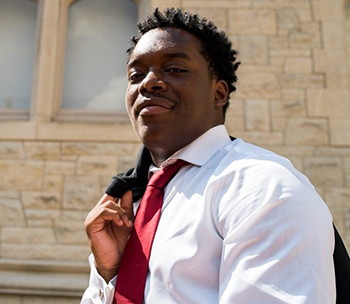
D'Angelo King
D’Angelo King ran for Indiana University’s student association on a platform of improving the school’s diversity and inclusion. Next week, he will join 19 other student leaders from across the country at USC Shoah Foundation’s first-ever Intercollegiate Diversity Congress to develop strategies to make his vision a reality.
The Intercollegiate Diversity Congress (IDC) Summit, to be held Oct. 13-14, 2017, on the USC campus, will convene student leaders from higher education campuses across the United States to support their efforts in building inclusive connected communities. USC Shoah Foundation will provide resources and training for the student leaders to be able to convene groups of students, staff and faculty to explore and engage in dialogue around campus climate issues.
King, a senior journalism and political science double major with a minor in African American studies, said that Indiana University’s student body president Dan Niersbach first learned about the IDC while attending the National Campus Leadership Council’s Presidential Leadership Summit in Washington, D.C. in June. Kori Street, USC Shoah Foundation Senior Director of Programs and Operations, gave a keynote presentation about how testimony and IWitness could be used to promote inclusion and tolerance on college campuses.
Although Niersbach will not be able to make it to the IDC, he encouraged King, who is the student association’s chief of marketing, and Mona Sehgal, treasurer, to attend. King said that after learning more about USC Shoah Foundation and the IDC from Sara Brown, postdoctoral teaching fellow at USC Shoah Foundation, he was eager to participate.
“That’s when I realized I feel like I have to be a part of this,” King said. “It sounds like an amazing opportunity that I’m looking forward to.”
One of King’s goals is to work with the administration at his school to increase the diversity of the student body. King and his fellow executive board members represent the most diverse board that the Indiana University Student Association has ever seen.
“Our school has a big campaign for diversity and inclusion, but when you look at our numbers it doesn’t reflect that,” King said. “Since [the student association executive board] is a direct reflection of the student body, we strive to be what we want the student body to look like going forward and show the student body how so many people from different backgrounds and different ideals can work together.”
King is looking forward to learning more about USC Shoah Foundation’s IWitness University programand how testimony can be used to teach and inspire students. He’s seen firsthand, while teaching seventh grade English last summer, how visual experiences help students retain more information.
“That’s what’s special about USC Shoah Foundation, you can read about these things that have happened to people during these genocides but to actually see a video of someone describing it and telling you that experience that [genocide survivors] go through, there’s a different feeling that you get from watching it,” he said.
King believes that universities are now at a tipping point. They must take this opportunity to learn from the past in order to avoid making the same mistakes that have historically led to intolerance, discrimination and even violence.
“It’s a cliché, but those who don’t know their history, they repeat it,” he said. “If we’re not aware of what has been done in the past or how we can prevent this we will end up in the same situation or worse.”